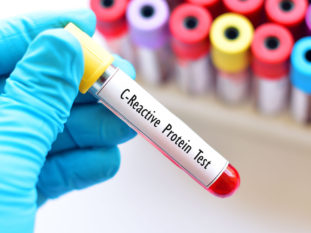Inflammation Risk Test Quick Facts: How to test your hs-CRP inflammatory risk
Which inflammation blood test is right for me?
There are a number of blood tests that estimate the level of chronic inflammation in the body, but the high-sensitivity C-reactive protein (hs-CRP) inflammation blood test is the standard for estimating relative risk of developing heart disease, stroke, and heart attack in otherwise healthy individuals.
The hs-CRP inflammation blood test is the standard for estimating relative risk of developing heart disease, stroke, and heart attack in otherwise healthy individuals.
What’s the best inflammation blood test for optimizing wellness?
The “high-sensitivity” description in the name of the hs-CRP test is important. Its sensitive nature allows for identification of low levels, but chronically present, of C-reactive protein which is present in inflammatory states.
For people seeking to improve their wellness, monitor, or optimize their health, regular monitoring of hs-CRP is helpful.
The best inflammation blood test must truly be the best:
- Accurate and precise
- Easy to use
- Meaningful results
- As painless as possible
- Reasonable cost
With Bloodscore, you can test your inflammatory risk as part of the Bloodscore Health Check profile, which only requires a few drops of blood. No doctor appointment, lab visit or big needle required!
It’s so simple, cheap and painless that you can test every 90 days and track your results as a trend. You can catch changes (like your average Inflammatory Risk score growing larger) before you develop a health problem.
How often should I take the hs-CRP blood test?
We love the hs-CRP test so much that we added it to our Bloodscore Algorithm. Now, it’s part of the Health Check at home lab test that Bloodscore members take every 90 days. This testing cycle is frequent enough to establish a meaningful trend of your scores, so that you can identify a change in your chronic inflammation and make a change before your body and health suffers.
You can monitor your inflammatory risk as part of your Bloodscore without having to take a separate test. With a tiny poke of the finger, you can test your inflammatory risk, cholesterol levels, blood sugar and more. If your inflammation score is elevated, you made benefit from additional tests such as an at home vitamin D level test.
Sources:
https://labtestsonline.org/understanding/analytes/hscrp/tab/test/


